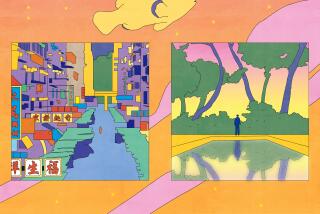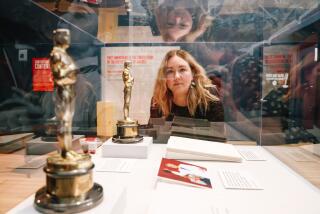A Look at World of Les Blank Films : Movies: The documentarian’s ‘Innocents Abroad,’ the saga of Americans on a bus tour of Europe, will precede the survey.
- Share via
“The World According to Les Blank,” the largest retrospective of the films of our foremost chronicler of Americana ever assembled for theatrical presentation, commences on the Fourth of July at the Monica 4-Plex. Today, Blank’s latest feature-length documentary, “Innocents Abroad,” begins a regular run there. The retrospective, which includes all of Blank’s completed films, marks the 25th anniversary of the founding of his El Cerrito-based Flower Films.
Blank came to town recently for the AFI Filmfest premiere of “Innocents Abroad,” an illuminating account of a group of Americans on a two-week bus tour of Europe--”22 cities, 10 countries, 14 days.” Sitting in the conference room of the Laemmle Theatres office above the Royal Theater in West Los Angeles, Blank, who has lived in Berkeley since 1975, talked about his career in general and the making of “Innocents Abroad” in particular. In recent years, Blank has trimmed his hair and beard and lost a paunch. At 56, his aging hippie look has given way to a youthful middle-aged appearance.
Blank, who has four documentaries in various stages of production, decided to become a filmmaker after seeing Ingmar Bergman’s “The Seventh Seal,” a watershed experience for film lovers of his generation. (He retains a lingering desire to do a fiction film.) After spending two years at USC film school, Blank knocked about Hollywood as a free-lance crewman. He formed Flower Films here in 1967 at the time he was finally able to make his first film, “God Respects Us When We Work but Loves Us When We Dance,” a record of L.A.’s memorable Easter Sunday Love-In that year.
Although given to shyness and humility, Blank has demonstrated an iron will and a steely determination to have persevered so long and so effectively as an independent filmmaker--and to have followed Werner Herzog into the Amazon to record, in Blank’s best film, “Burden of Dreams,” the increasingly obsessed German director in his making of “Fitzcarraldo,” in which Klaus Kinski pulls a steamship through the jungle.
“I think I’ve been more influenced by Bergman, Fellini and Huston than by other documentary filmmakers,” said Blank. “I felt more of an urge to convey an emotion and to tell a story than to report on reality. I got criticized a bit back in 1967, with ‘The Blues Accordin’ to Lightnin’ Hopkins,’ for showing too much beauty instead of the ugly reality of the area in Texas. The Rotterdam Festival turned down the film because it was ‘too humanitarian.’ ” More recently, Telluride, where Blank had long been a staple, turned down “Innocents Abroad” because, he said, they thought it was “too much of a crowd-pleaser.”
What Blank does, has always done, more than anything else and better than anyone else, is to celebrate this country’s rich ethnic diversity. Time and again he’s returned to Louisiana, where while attending Tulane as an English major he fell in love with the food and music of the region, to make such films as his Mardi Gras celebration “Always for Pleasure.” Blank feels his work has grown directly out of his childhood as the son of a Tampa real estate agent. From the time his saw his first film, “Pinocchio,” he has loved the movies, and he has always loved reading stories.
Of equal importance is the neighborhood where he grew up. “We lived on the edge of the suburbs. Across the street was where what my mother called white trash and rednecks lived,” he said. “Also nearby was the black community, and I’d go there with my baby-sitter. I was always interested in what these people ate; it also seemed to taste so much better than what we ate. Then I’d listen to the Cuban radio station. . . .
“I was always curious as a kid, looking for new experiences and hearing different points of view.”
This endless curiosity and genuine interest suffuses all his work, which includes his Tex-Mex “Chulas Fronteras,” his films of Appalachia, his celebrations of the culture and music of Serbian-Americans, and of native Hawaiians and so on. Blank has always had an affinity for ordinary working people, who are so often either ignored or scorned. His ability to listen is what makes him the perfect documentarian for “Innocents Abroad.” Rather than satirize his economy tourists who crowd so much in so little time, he discovers how much the trip means to three dozen couples, who range from newlyweds to the newly retired, who are alternately amused and awed by so much antiquity.
“Innocents Abroad,” commissioned by the BBC and budgeted at $300,000, is one of the few films Blank did not originate. “We got on the very last bus tour at the end of the season last October in London. It was the luck of the draw: a bus load of 36 interesting people--I and my crew took up four seats--who all got along with each other. It was my honeymoon: I got married to Chris Simon three days before we left. Chris had a 40-pound sound recorder on her lap the whole time, and I had my 40-pound camera.”
Blank, who has been married twice before, agrees that his best stroke of luck was in landing for his film such an astute and articulate observer of human nature as the tour’s guide, Mark Tinney, a polished, well-spoken Englishman who understands very well--but without condescension--that his American tourists want to travel in a nice comfortable cocoon.
While filming was largely uneventful it was taxing, involving cornering the tourists, often in their hotel in the evening, without imposing on their time to the degree that it would spoil their trip.
“The biggest problem was moving all the time,” said Blank. “We could never linger. At the end of the tour we passed out questionnaires, asking if ‘on your next trip would you like this film crew to accompany you again?’ All but one or two said yes; I was surprised that even one would want us back.”
More to Read
Only good movies
Get the Indie Focus newsletter, Mark Olsen's weekly guide to the world of cinema.
You may occasionally receive promotional content from the Los Angeles Times.









